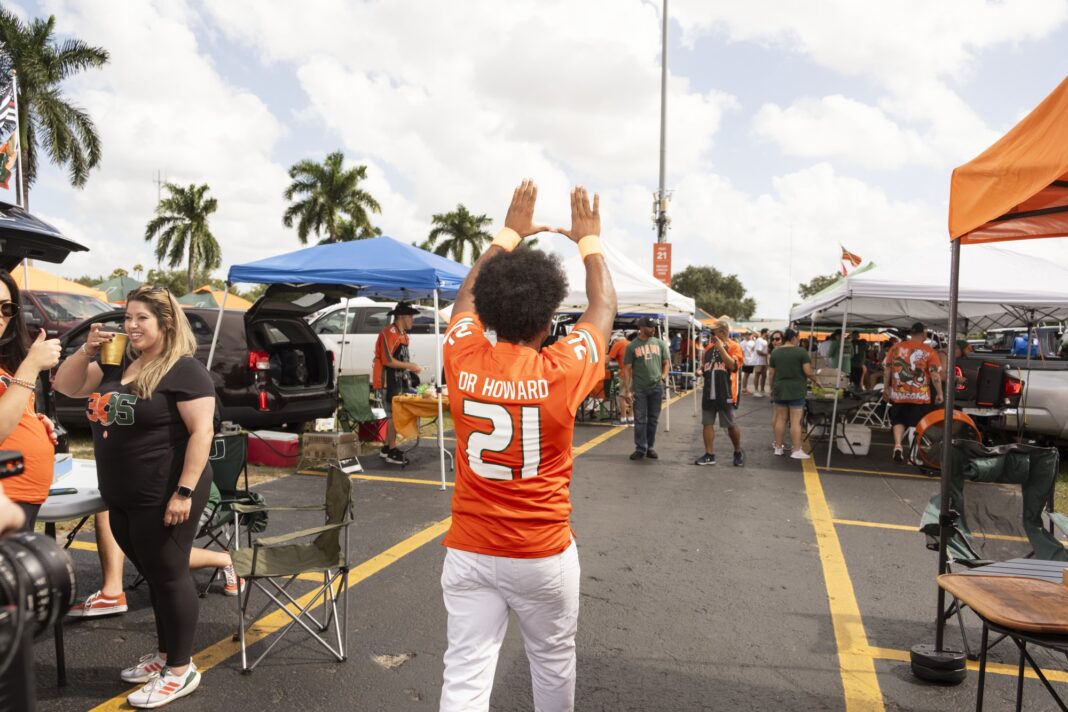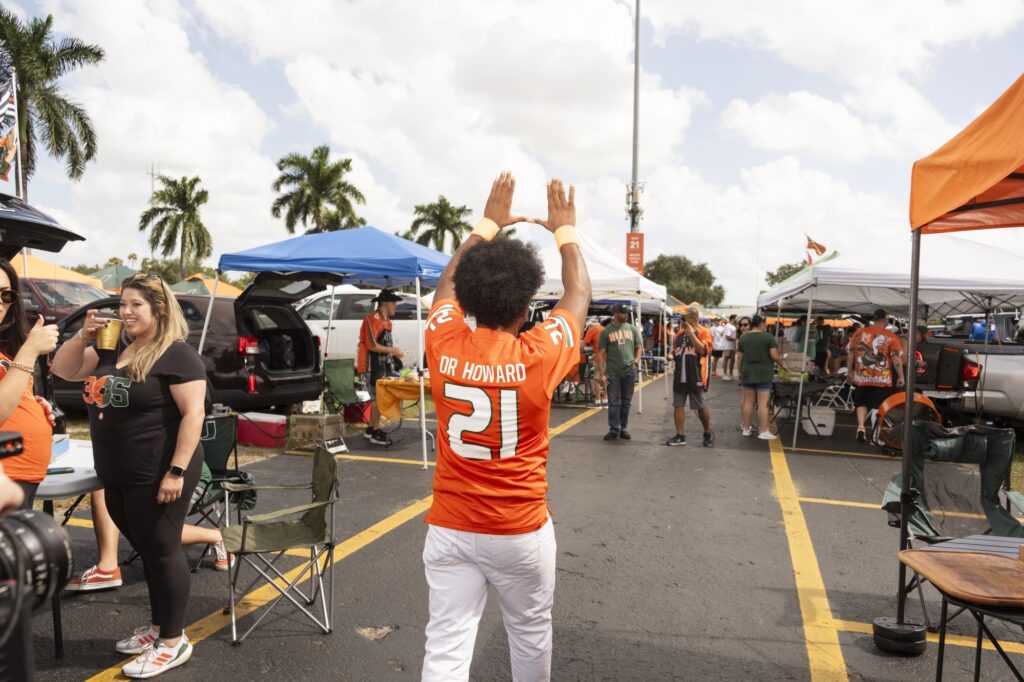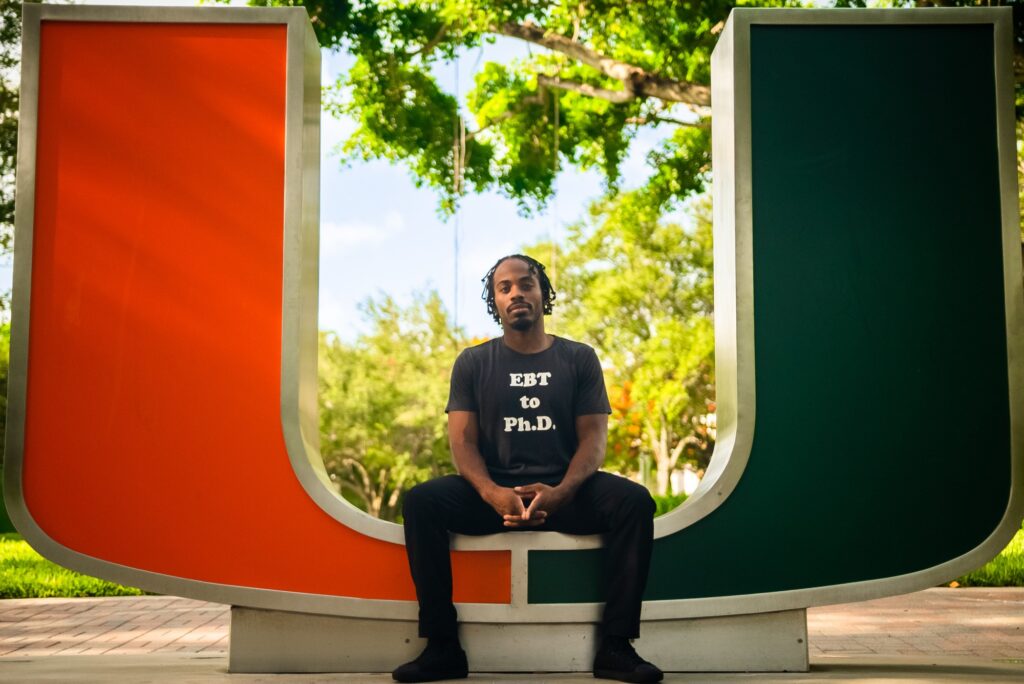

Trumpets, tailgates and the “U” symbol everywhere — these are the opening images of UM professor Simon Howard’s music video for his latest single, “Throw Up The U.”
Like its title suggests, the two-minute track celebrates the Miami Hurricanes and warns opponents with its catchy refrain: “Houston, we got a problem, Hurricanes coming through — throw up the U!”
After releasing the song on YouTube and music streaming platforms last month, Howard sees a bigger vision for its reach.
“I want students, alumni, faculty, staff and administrators playing it,” Howard said. “The biggest thing I can hope for is for the song to be played at Hard Rock Stadium during the games and have everyone throwing up the U, while chanting the chorus ‘Throw Up The U!’”
Howard sees his song as a token of appreciation for UM football’s legacy and an anthem for ’Canes fans.
“We are five-time national champions and have some of the most memorable games in college football history,” Howard said. “What better way to show my appreciation of this legacy than writing and recording a song commemorating and highlighting this greatness?”
His artist name SiHow the Doctor comes from his full name and his PhD in Social Psychology from Tufts University. Howard joined the UM psychology faculty in January 2022.
Though he’s a passionate UM football fan, he relocated to the 305 with dreams of expanding his research to explore the health impacts of vicarious experiences of racism on marginalized communities.
Howard came up with the motto “EBT to PHD” during grad school, a reminder of his upbringing that included food stamps and welfare. Even after earning a doctoral degree and a tenure-track position, he aims to remember his roots.

“Statistically, I should not be here, but unlike some folks who try to distance themselves from where they came from after they get their doctorate or other advanced degrees, I cannot do that,” Howard said. “My life experiences growing up made me into the person I am today and ideologically, I will forever be aligned with those who share that struggle.”
One of his main motivations in becoming a professor was to be the professor he never had.
“I am passionate about education, and I strive to leave a lasting impression on students that I come across in my classes and research lab,” Howard said, “especially Black students, students from lower socio-economic status backgrounds and first-generation college students, because those students are me and vice versa. Representation matters.”
He teaches PSY 210, Social Psychology, and PSY 475, the Psychology of Racism. His goal as a professor is to create “brave space” in the classroom because there is no such thing as “safe space.”
“I cannot 100% control what we people do with the information that is shared in that context, but what I do have control over is the effort I put into cultivating a class culture in which we turn down the volume of the outside world,” Howard said.
The concept comes from author and speaker Micky ScottBey Jones, who wrote “An Invitation to Brave Space” that seeks to create collaborative environments.
“[We] give each other latitude to engage in this conversation where we are, understand that we will not be perfect and that we might make mistakes along the way,” Howard said.
In discussions of race, the social psychology scholar is aware that each student comes into his class with varying levels of knowledge.
“Learning to understand racism is like learning a new language,” Howard said. “Some people may be more familiar with the language than others, but over time with practice, each conversation becomes more enriching as greater understanding is achieved.”
The former Marquette University professor brought his Psychology of Racism course to UM. He compares learning about racism to language learning, a process where students come in at different fluency levels and achieve greater understanding throughout the semester.
His academic duties also include directing the Psychology of Racism, Identity, Diversity and Equity (PRIDE) research lab at UM, which investigates issues related to stereotyping and prejudice. Much of Howard’s music reflects themes he explores in his research.
For students hoping to pursue a career in research or academia, Howard encourages them to get research experience early, remember their “why,” avoid burnout and build a support village, even if it’s a virtual one.
“There’s an African proverb that says, ‘if you want to go fast, go alone. If you want to go far, go together,’” Howard said. “This is a fact. Having a tribe of folks invested in your success and mental well-being is the cheat code for success.”
A quick Google search of Howard will yield an online presence that is both candid and unconventional for an academic, but his social media is simply an extension of who he is.
“I strive to be my full, authentic self in all aspects of my life, and social media is no different,” Howard said. “I am multidimensional and I believe that my social media reflects that. I am a professor, a rapper, a capoeirista [and] a traveler.”
Between teaching psychology courses, mentoring students, fulfilling service obligations and publishing research, his to-do list never ends.
While he successfully balances these roles, the demands can lead to an endless to-do list, perpetual stress and poor health.
“I make it a point to prioritize my psychological and physical well-being. Life is way too short to not be doing things that make you happy and fill your cup,” Howard said.
Being childless and unpartnered also helps to balance academia, music and travel.
“Until that day comes, I’ll be catching flights and feelings,” Howard said.






